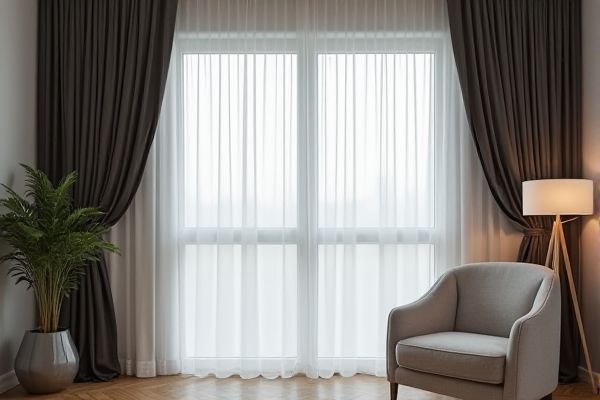
Blackout curtains provide superior light-blocking and insulation benefits, ideal for creating a dark, cozy environment, while sheer curtains allow natural light to filter through, enhancing brightness and privacy with a soft, elegant touch. Discover how you can choose the perfect curtain type to suit your room's needs and style by reading the rest of the article.
Table of Comparison
| Feature | Blackout Curtains | Sheer Curtains |
|---|---|---|
| Light Control | Blocks 90-100% of light | Filters light, allows soft natural light |
| Privacy | Provides full privacy | Offers limited privacy |
| Energy Efficiency | Improves insulation, reduces heat loss/gain | Minimal impact on insulation |
| Material | Thick, opaque fabrics like polyester or triplex | Lightweight, translucent fabrics like voile or chiffon |
| Use Case | Ideal for bedrooms, media rooms, offices | Best for living rooms, kitchens, layered designs |
| Noise Reduction | Helps reduce outside noise | Minimal noise reduction |
| Maintenance | Machine washable, durable | Delicate, requires gentle washing |
| Cost | Moderate to high | Low to moderate |
Introduction to Blackout Curtains and Sheer Curtains
Blackout curtains are engineered with dense, tightly woven fabrics designed to block out nearly 100% of sunlight, making them ideal for bedrooms, media rooms, and spaces requiring complete darkness. Sheer curtains, made from lightweight and translucent materials such as voile or chiffon, allow natural light to diffuse gently while providing minimal privacy. Choosing between blackout and sheer curtains depends on desired light control, privacy levels, and room ambiance.
Key Differences Between Blackout and Sheer Curtains
Blackout curtains block nearly 100% of external light, providing enhanced privacy, noise reduction, and improved thermal insulation, making them ideal for bedrooms and media rooms. Sheer curtains are made of lightweight, translucent fabrics that diffuse sunlight, offering a soft glow and maintaining privacy without completely obstructing the view. The primary difference lies in functionality: blackout curtains prioritize light-blocking and energy efficiency, while sheer curtains focus on aesthetic appeal and gentle light filtration.
Light Control and Privacy: A Comparative Overview
Blackout curtains provide superior light control by blocking up to 99% of sunlight, making them ideal for bedrooms and media rooms where darkness is essential. Sheer curtains allow natural light to filter through while offering limited privacy, suitable for living spaces that benefit from soft illumination without complete concealment. Your choice between blackout and sheer curtains depends on balancing the need for darkness and privacy versus natural light and ambiance.
Energy Efficiency: Which Curtain Type Saves More?
Blackout curtains provide superior energy efficiency by significantly reducing heat transfer through windows, helping to maintain indoor temperatures and lower heating and cooling costs. Sheer curtains offer minimal insulation, allowing more sunlight and heat to pass through, which limits their ability to conserve energy. For maximizing energy savings, blackout curtains are the optimal choice compared to sheer curtains.
Aesthetic Appeal: Style Comparison
Blackout curtains offer a sleek, modern aesthetic with their dense fabric and solid colors, providing a clean and polished look ideal for minimalist or contemporary interiors. Sheer curtains create an airy, light-filled atmosphere through translucent materials and soft hues, enhancing romantic or coastal-themed decor with a delicate, ethereal style. Choosing between blackout and sheer curtains depends on whether the desired room ambiance favors bold opacity or gentle diffusion of natural light.
Best Rooms for Blackout Curtains vs Sheer Curtains
Blackout curtains are ideal for bedrooms, home theaters, and nurseries where light control and privacy are crucial for quality sleep and optimal viewing experiences. Sheer curtains work best in living rooms, kitchens, and sunrooms by allowing natural light to brighten the space while offering a degree of privacy. Depending on your light management needs, choosing blackout curtains enhances darkness, while sheer curtains maintain an airy, illuminated atmosphere.
Installation and Maintenance Differences
Blackout curtains typically require sturdier hardware such as heavy-duty rods and brackets for proper installation due to their thicker fabric, while sheer curtains can be hung using lightweight rods or even tension rods for easy setup. Maintenance differs significantly as blackout curtains often need gentle washing or dry cleaning to preserve their light-blocking properties, whereas sheer curtains are generally machine washable and require less delicate care. Choosing the right curtain for your space depends on your willingness to maintain the fabric and the ease of installation you prefer for Your windows.
Cost Comparison: Blackout Curtains vs Sheer Curtains
Blackout curtains typically cost more than sheer curtains due to their thicker, insulating fabric designed to block light and reduce noise. Sheer curtains are generally more affordable, offering a lightweight and decorative option that allows natural light to filter through. When budgeting for window treatments, consider that your higher investment in blackout curtains may provide energy savings and enhanced privacy, while sheer curtains offer a cost-effective aesthetic solution.
Pros and Cons of Blackout Curtains
Blackout curtains provide excellent light blocking and thermal insulation, making them ideal for bedrooms and media rooms by enhancing privacy and reducing energy costs. However, they tend to be heavier and more expensive, potentially limiting airflow and natural light when closed. While blackout curtains offer superior darkness control, they may not suit spaces where a lighter, airier atmosphere is desired.
Pros and Cons of Sheer Curtains
Sheer curtains allow natural light to filter through, creating a bright, airy atmosphere while maintaining some privacy, making them ideal for living rooms and spaces where light is desired. However, they offer limited light blockage and minimal insulation, which can result in less energy efficiency and reduced privacy, especially at night. Their delicate fabric may also be less durable and harder to clean compared to heavier curtain options.
 homyna.com
homyna.com